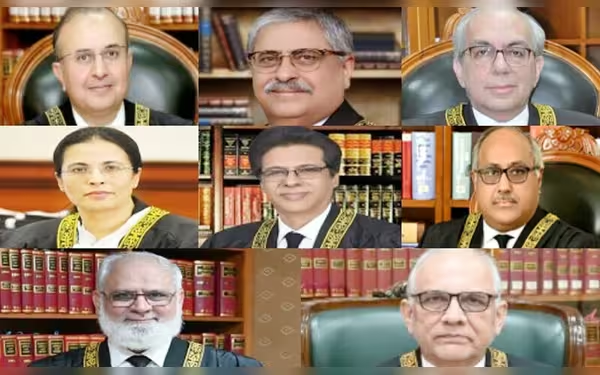Saturday, November 16, 2024 05:33 PM
Supreme Court's Verdict on ECP: A Turning Point for Electoral Integrity
- Supreme Court criticizes ECP for electoral misconduct.
- Judgement emphasizes citizens' right to choose political parties.
- Legal experts call for immediate implementation of the ruling.
 Image Credits: dawn
Image Credits: dawnSupreme Court's ruling on reserved seats highlights ECP's failures, emphasizing electoral integrity and citizens' rights.
The recent ruling by the Supreme Court of Pakistan regarding reserved seats has sparked significant discussion among legal experts and political analysts. This detailed judgement, which spans 70 pages, was issued following the court's earlier order on July 12, declaring the Pakistan Tehreek-i-Insaf (PTI) eligible for reserved seats in both national and provincial legislatures. The court's decision has been described by some as a "chargesheet" against the Election Commission of Pakistan (ECP), highlighting serious concerns about the ECP's role in ensuring fair electoral processes.
In its ruling, the Supreme Court criticized the ECP for failing to act as a "guarantor institution" during the February 8 elections. The judgement pointed out that the ECP's actions had not only caused confusion but also prejudiced PTI and its candidates, as well as the voters who supported them. Legal experts have emphasized that the ECP's numerous "unlawful acts and omissions" have raised doubts about its impartiality and effectiveness.
Barrister Rida Hosain, a prominent legal figure, characterized the court's majority judgement as a "charge sheet" against the ECP, asserting that the commission's conduct during the elections did not meet constitutional obligations. She noted that the judgement extends beyond the issue of reserved seats, raising broader concerns about the ECP's role as a neutral entity in the electoral process. According to Hosain, the court's decision is rooted in fundamental democratic principles, emphasizing the right of citizens to vote for the political party of their choice.
Another lawyer, Abdul Moiz Jaferii, described the judgement as a "well-reasoned articulation" of the reasons behind granting reserved seats to PTI. He pointed out that the actions of the ECP and returning officers were deemed illegal, and he stressed that public functionaries owe a "debt of justice" to rectify their mistakes. Jaferii highlighted that the court was not swayed by technical limitations that could obstruct justice, emphasizing the importance of protecting citizens' fundamental rights.
Asad Rahim Khan, another legal expert, echoed the call for immediate implementation of the court's ruling. He noted that the detailed judgement has thoroughly addressed key issues, including the confusion surrounding the electoral symbol and the ECP's mistakes. Khan expressed optimism that the court's decision would prevent "democratic backsliding" and reaffirmed the need for the ECP to fulfill its legal obligations.
The Supreme Court's detailed judgement serves as a critical reminder of the importance of accountability and transparency in the electoral process. As the ECP faces scrutiny over its actions, it is imperative for the commission to take the necessary steps to restore public trust and ensure that the democratic rights of citizens are upheld. The ruling not only impacts PTI but also sets a precedent for future electoral conduct, emphasizing that the will of the voters must always be respected and protected.













